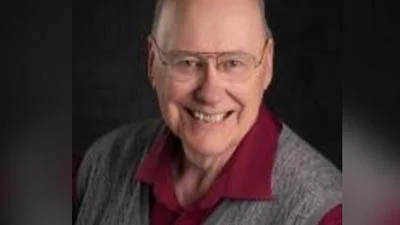About the series: On Main Hall Green With … is an opportunity to connect with faculty on things in and out of the classroom. We’re featuring a different Lawrence faculty member each time — same questions, different answers.
Gustavo Fares, a member of the Spanish faculty at Lawrence for 22 years, has put a wide-ranging academic background to use in and out of the classroom.
That background includes training in law, painting, and printmaking, as well as a Ph.D. in Latin American literature.
His research has often focused on topics such as Latin American cultural studies, legal studies, visual arts, and border studies. In 2004, he was a Fulbright Visiting Professor at the Universidad Nacional de Cuyo, in Mendoza, Argentina. He also has been an active partner with the College Board for more than two decades, assisting high school Advance Placement (AP) students studying Spanish.
His book, Domingo F. Sarmiento’s Argirópolis. A Critical Translation, was released in 2021, helping him earn Lawrence’s Award for Excellence in Scholarship.
Fares holds a Ph.D. in Latin American literature from the University of Pittsburgh; a master’s degree in foreign languages and literature from West Virginia University; a master’s in visual arts, painting, and printmaking from West Virginia University; and a J.D. law degree from Universidad de Buenos Aires.
We caught up with Fares to talk about interests in and out of the classroom.
In the classroom
Inside info: What’s one thing you want every student coming into your classes to know about you?
This is my 22nd year at Lawrence, and I love my work. I would like students to know that I am here to help them be successful in any way that I can in the classroom and outside of it. I see their time in the classroom as one part of their education. Playing sports, living in an educational-residential environment, traveling while studying abroad, to name just a few activities, are also part of their education, and I love it when they take advantage of what Lawrence has to offer.
Getting energized: What work have you done or will you be doing at Lawrence that gets you the most excited?
Teaching and learning get me energized. I love to share what I bring to the classroom, and I also learn so much from my students. For me, it is a privilege to be part of their lives, and their energy and enthusiasm provide me with incentives to try to be better at what I do. In terms of learning, I also enjoy traveling and doing research, which I then bring back to my courses.
Going places: Is there an example of somewhere your career has taken you (either a physical space or something more intellectual, emotional, or spiritual) that took you by surprise?
In 2008, I had the chance to teach for the Semester at Sea program, which took me and my family on a semester-long voyage in a ship around the world. In 2011, I taught again on a summer voyage throughout the Mediterranean. To have had these experiences as part of my career continues to impact me by how they opened my eyes to so many different and diverse cultures and peoples.
Out of the classroom
This or that: If you weren’t teaching for a living, what would you be doing?
I have been creating art for as long as I can remember. If I weren’t teaching, I would spend more time painting, drawing, and making prints. My work is represented by Marzén Gallery/Integrated Art Works, in Madison, and can be seen here.
Right at home: Whether for work, relaxation, or reflection, what’s your favorite spot on campus?
I love to sit and read in the Pusey Room in the Warch Campus Center. I have always enjoyed the vistas from the windows, the quiet space, the light. For me, it is an ideal place to just be.
One book, one recording, one film: Name one of each that speaks to your soul? Or you would recommend to a friend? Or both?
A book I read as a teenager and have been re-reading ever since is the novel Pedro Páramo by the Mexican writer Juan Rulfo. Each time I read it, it acquires a different resonance, as happens with most good literature, according to what is going on at the time in my life. Its ghostly characters, their search for (dead) family members, the dream world they inhabit, their strong criticism to social and religious mores, make it a fascinating work of fiction.
I enjoy sci-fi movies since they portray alternative realities, allowing us to consider our world from different perspectives. Two of my favorite films are Blade Runner and the sequel, Blade Runner 2049. The films inquiry into what is human and what is not, through the expedient of the replicants, and how to tell one from the other, is a topic that has become much more discussed given the prevalence of A.I. today.
I’m also a podcast fan, and I recommend The Moth. The stories are interesting and engaging.
Original source can be found here.





 Alerts Sign-up
Alerts Sign-up